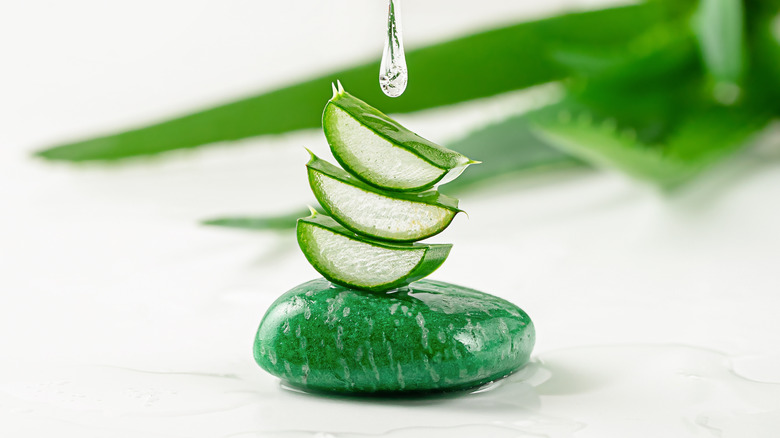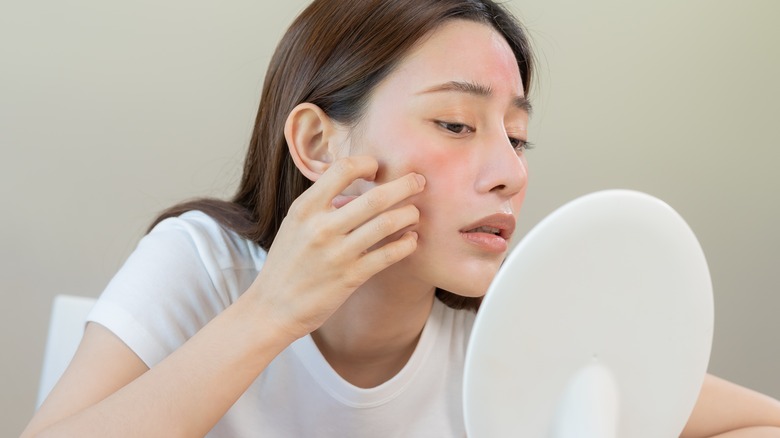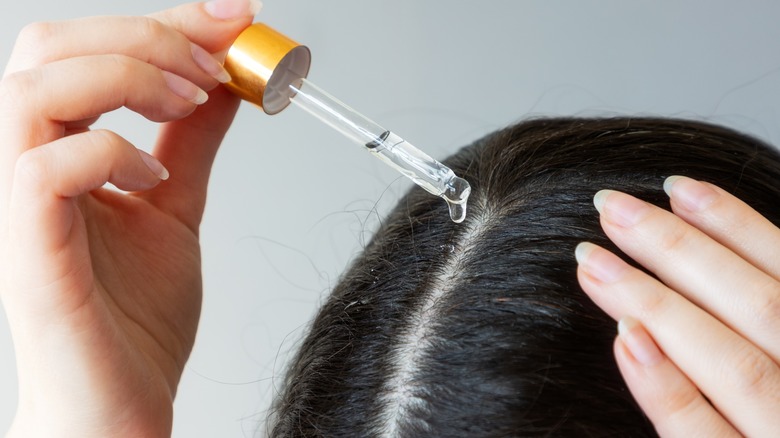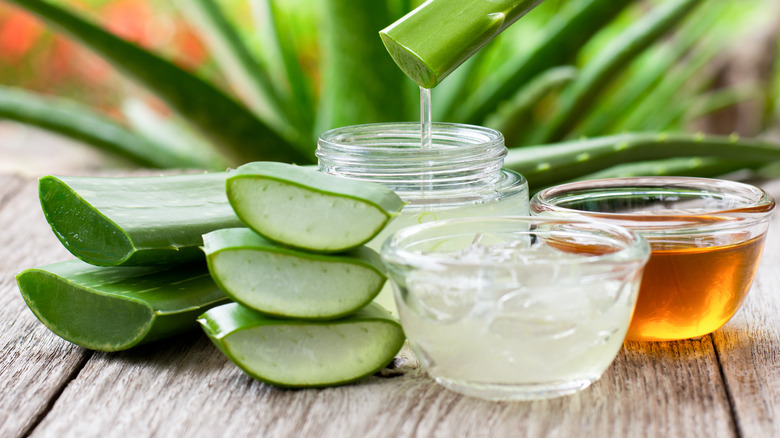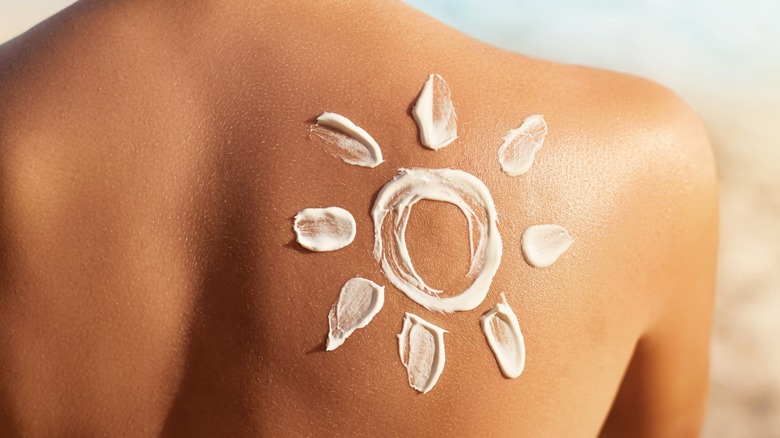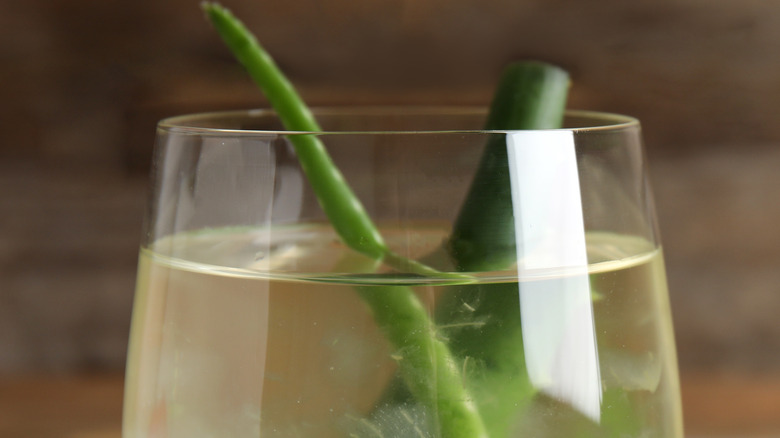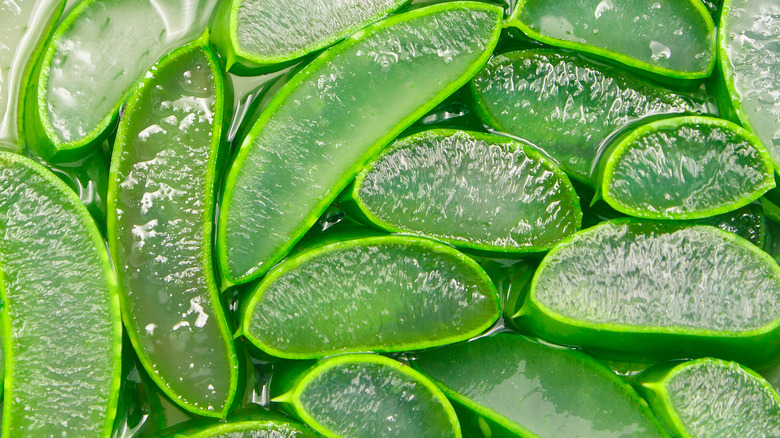The Real Effects Aloe Vera Has On Your Body
Chances are you've probably heard about the healing powers of aloe vera at some point. In 2021, it was one of the most Google-searched skincare ingredients in the world, according to Skincare Hero.
Aside from adorning living rooms everywhere, the succulent plant is commonly used for both cosmetology and medicinal purposes (via a Natural Medicine Journal). In fact, aloe has been used to treat a multitude of ailments, ranging from skin conditions to stomach infections to bug bites. Originally grown in dry and subtropical destinations, the herb has been lauded in various cultures, including African, Asian, and Mediterranean. Aloe gel, which is extracted from the inner leaf, is often used topically for dehydrated skin and sunburn. Aloe juice, on the other hand, also known as latex, is known for its laxative effects, and has been used to relieve constipation (via Journal of Environmental Science and Health).
Traditional medicine certainly hasn't ignored aloe vera. Its benefits aren't merely anecdotal; studies have shown that the plant is a powerful remedy for burn wounds, skin irritation, and other ailments. So, what is it about this versatile ingredient that makes it so special?
It can heal skin wounds
Aloe vera is famous for being the go-to natural product for burns, abrasions, scrapes, and cuts, according to the Iranian Journal of Medical Sciences. Its therapeutic use for skin lesions and diseases can be traced back to 1500 B.C., and it's remained popular in countries like Greece, Mexico, and China ever since.
The ancient plant has been shown to heal skin conditions like psoriasis, ulcers, herpes, and bedsores. It can soothe a nasty burn after it's happened, reducing the chances of getting a blister. It's also commonly used for sunburn rashes. The application of aloe gel can be used as a complementary treatment for all kinds of skin wounds. Aloe vera is packed full of immune-boosting nutrients like polysaccharides, amino acids and zinc, which preserve the moisture and integrity of your skin.
Aloe works its magic by reducing inflammation, per a paper published in Surgical Science. In turn, it can relieve pain, itching, burning, and redness. It promotes the synthesis of cytokines, which speed up the healing process and help your body fight infections. What's more, through stimulating the production of collagen and removing dead tissue, aloe vera encourages the skin to repair itself.
It helps minimize wrinkles
Aging is an inevitable part of being human. We can't stop the march of time, but we can slow down the speed and impact of aging by adopting some healthy life hacks. For those who are keen to avoid the toxins in many skincare products, aloe vera is a natural and sustainable way to minimize fine lines and wrinkles, according to research in Clinical, Cosmetic and Investigational Dermatology.
Egyptian queens Cleopatra and Nefertiti famously added Aloe Vera to their beauty rituals, per a paper in the Iranian Journal of Medical Sciences. The botanical ingredient has 75 compounds, after all, including amino acids, minerals, vitamins, and water. They help keep your skin vibrant and fight off free radicals that give rise to creases and blemishes.
A 2020 study published in the Journal of Dermatology found that women who took aloe vera gel supplements for 12 weeks had younger-looking skin compared to those who took a placebo. This is because aloe vera contains sterols, which increase moisture and promote skin barrier function by boosting production of collagen and hyaluronic acid. So, consuming aloe vera won't make your wrinkles magically vanish, but it can make them less visible and reduce some signs of aging, say researchers.
It boosts gut health
Aloe vera is sometimes used as a remedy for constipation, according to researchers (via Journal of Neurogastroenterology and Motility). It can also help with gastrointestinal disorders like irritable bowel syndrome. Its anti-inflammatory and anti-ulcerative properties, in particular, can reduce gastrointestinal inflammation and prevent ulcers from forming. It also has a strong laxative effect that facilitates gastrointestinal motility.
High in fiber content, aloe vera gel contains fructans (also known as polysaccharides), notes a 2017 study from the Journal of Agricultural and Food Chemistry. These prebiotic compounds support the growth of beneficial gut bacteria. The researchers found that fructans produced large amounts of short chain fatty acids (SCFA) -– the main metabolites created by friendly bacteria in your microbiome. Not only can this lower the risk of bowel inflammatory diseases, but it can also enhance the process of digestion, reduce obesity and body fat, and lower the risk of chronic diseases including some forms of cancer.
By helping you maintain gut microbial homeostasis, aloe vera can help your body combat toxins and viruses (via a paper in the Journal of Gastroenterology and Hepatology Research). It can reduce some of the harmful effects of pathogens in your body.
It gets rid of dandruff
When used on your scalp and hair, aloe vera may be an effective remedy for dandruff. A 2017 study published in the journal Minerva Medica found that people who used aloe vera gel topically saw an 80% improvement in symptoms of seborrheic dermatitis. The condition can appear on many different parts of the body (via a review in the Journal of Clinical and Investigative Dermatology). Dandruff is essentially an inflamed form of seborrhoeic dermatitis on the scalp, which manifests as itchy, flaky, and scaling skin.
Researchers largely attribute the healing effects of aloe to its antifungal and anti-inflammatory activities (via Biomed Research International). The short-stemmed plant contains unique enzymes that nourish the scalp and relieve irritation, per WebMD. It can combat dryness and keep your head hydrated by reducing the build-up of oil on the scalp. Be sure to use a product that contains real aloe, though — and look out for fragrances and unnecessary ingredients. Alternatively, you can go straight to the source and gently rub the gel from the aloe leaves directly onto your scalp or wounds.
It can prevent the growth of bacterial infections
Aloe vera has been used as an antiseptic for centuries (via a paper in the Journal of Environmental Science and Health). Revered as the "plant of immortality" in early Egypt, the herb has been celebrated as a medicine for various ailments and diseases: Skin disorders, constipation, external and internal ulcers, and immune conditions like lupus.
A 2021 study found that aloe vera gel can treat microbial skin wound infections and prevent them from developing and spreading (via Veterinary Medicine and Science). The pharmacologically active ingredients in the leaf and root of the plant give it its antimicrobial and fungicidal properties. Applying aloe gel to your wounds can help fight off and stop the growth of bacteria, which in turn reduces the breeding ground for viruses and infections.
The antiviral effects of aloe vera has meant that it can treat conditions like rheumatoid arthritis, diabetes, tumors, and even cancer, per research (via Journal of Traditional and Complementary Medicine). In recent years, it's even played a role in treating fertility problems and AIDS (via Veterinary Medicine and Science). Its potent antibacterial ingredients can be found in the inner gel of the leaves, say researchers.
It reduces and relieves pain
Interestingly, with its thick, plump leaves, aloe vera can be used to ease pain (via a paper in Ayu). Some studies have shown that the gel can be applied topically to painful mouth ulcers. Not only does it bring down soreness, but it also accelerates healing. Additionally, it can reduce the pain associated with burn injuries.
Given its powerful anti-inflammatory properties, the spiky plant may alleviate the swelling caused by rheumatoid arthritis, reports a study published in the Central European Journal of Immunology. The gel can be rubbed directly onto achy joints to reduce symptoms like pain, stiffness, and immobility. Per research, oral aloe vera supplements have also been found to effectively treat chronic non-cancer pain (via the British Journal of Community Nursing).
Another medicinal substance found in aloe vera gel is glycoprotein, which plays a masterful role in wound recovery by promoting blood supply to the area (via Ayu). These proteins are believed to have anti-inflammatory effects which may contribute towards pain relief, per Skin Science.
It's beneficial for brain health
A lot has been said about aloe vera's beneficial effects on the brain. Though we can't escape from aging, the antioxidant may slow down the process, say researchers (via the Journal of Gastroenterology and Hepatology Research).
Patients with metabolic syndrome experienced improvements in their memory after having an aloe vera drink, according to research published in the International Conference of Public Health. The plant has numerous biologically active substances such as flavonoids and phenolcarboxylic acids, which can help boost learning and prevent forgetfulness.
In another study carried out over a year, patients with Alzheimer's disease saw improvements in their symptoms including the restoration of lost cognitive abilities (via Journal of Alzheimer's Disease). While it shouldn't replace prescribed medical treatment, aloe vera might serve as a complementary medicine to enhance cognitive functions.
Based on the findings of a 2022 study, the cactus's cousin may also help lower the risk of depression in some people (via Nutritional Neuroscience). The research on the link between consuming aloe vera and mental health is still in its infancy, but appears to show promising results.
It protects the skin from ultraviolet (UV) damage
Aloe vera has long been embraced for healing sunburns (via a paper in the Journal of Traditional and Complementary Medicine). The leaf's soothing gel can cool down inflammation. It also contains antioxidants and vitamins that provide moisture and repair the skin. As an antibacterial, aloe juice or gel can help treat irritated and peeling skin.
The drought-resistant plant may also be used as a natural sunscreen, according to a study published in Photochemical and Photobiological Sciences. Unprotected exposure to sunlight is a key risk factor for cancer, and is known to cause premature aging. Aloe vera gel can shield your skin from the sun's destructive ultraviolet (UV) rays. In turn, it can reduce photodamage and wrinkles. This might explain why people have turned to aloe for centuries to help keep their skin more youthful and healthy.
Aloe vera gel by itself won't protect your skin from the scorching sun, say experts (via Environmental Science and Pollution Research). Therefore, it's recommended that pure aloe-based products are used in addition to sunscreen.
It improves oral health
Aloe vera is not just added to creams and cosmetic products, but is also often included in toothpastes and mouthwashes (via a paper in the Journal of Pharmacy and Bioallied Sciences). The healing plant is known to reduce plaque and may prevent gingivitis, namely mild inflammation of the gums, notes a study published in Oral Health and Dental Management. This makes aloe vera juice an excellent alternative to mouthwash.
Aloe vera gel can also be used as part of oral care (via Journal of Pharmacy and Bioallied Sciences). As an antiviral, it may treat and prevent dental cavities and reduce the risk of periodontal disease. Some people use it around their dental implants to inhibit the growth of bacteria. Others use it as a natural ointment for canker sores, which are small, painful blisters that crop up inside the mouth and on the lips. Research shows that applying aloe vera gel to mouth ulcers can help them heal quicker and less painfully (via Dental Research Journal).
According to research, the daily consumption of aloe vera gel can curtail the growth of certain bacterial species in the mouth (via The Journal of Multidisciplinary Care Decisions in Dentistry). For this reason, aloe is an effective home remedy for periodontitis –- a serious form of gum disease that can eat away your dental bones and the ligaments connecting your teeth.
It can lower blood sugar levels
Researchers have credited aloe vera for a number of health benefits, including balancing out blood sugar levels (via the Journal of Traditional and Complementary Medicine). In a study from the Journal of Alternative and Complementary Medicine, researchers found that sipping aloe vera juice helped people with diabetes keep their condition in check. After ingesting aloe vera, patients experienced a notable drop in their fasting blood glucose levels.
Aloe vera is suited to treating diabetes-related issues for numerous reasons, say researchers (via the Journal of Food Science and Technology). It has an abundance of active ingredients that have a therapeutic effect on blood sugar, including zinc and magnesium. It also boosts the responsiveness of the body's tissues towards insulin, so that insulin becomes more effective.
Aloe's antidiabetic and cardioprotective properties may also stem from its ability to reduce oxidative stress in the body (via the Journal of Traditional and Complementary Medicine). There's evidence that aloe vera gel supplements improve metabolism of carbohydrates. They can also improve metabolic issues in people with prediabetes and diabetes by lowering body fat and body weight.
It soothes and relieves ulcers
It's not just the ulcers in your mouth that may benefit from the soothing prowess of aloe vera. The cactus-like plant is widely known for remedying both external and internal ulcers, say researchers (via the Journal of Environmental Science and Health).
Ingesting the inner leaf gel of the aloe vera plant can help treat stomach ulcers, according to a 2022 study from the Brazilian Journal of Pharmacognosy. By acting as an anti-inflammatory agent, aloe can reduce the size of ulcers and bring down discomfort. It may also soothe skin ulcers and amp up the wound healing process. After all, aloe gel contains an abundance of essential amino acids and inorganic electrolytes like potassium, magnesium, and iron.
The aloe plant has been reported to treat diabetic foot ulcers, which can lead to a number of life-threatening complications if ignored, per a study from the journal Current Drug Discovery Technologies.
It can treat allergies
Aloe vera's anti-inflammatory and analgesic properties make it a great natural balm for seasonal allergies like rhinitis and hay fever, per research (via the Indian Journal of Dermatology). Glycoprotein, one of the key ingredients of the aloe plant, has been shown to have anti-allergic properties. This includes a component called alprogen, which blocks the release of histamine, the chemical that's created in the body in response to allergens. For this reason, aloe vera gel or supplerments may help relieve some of the nasty symptoms of allergies like swelling, itching, sneezing, and mucus.
Aloe vera gel is highly effective in the treatment of itchy rashes, according to a 2022 study published in the Journal of Oncology Pharmacy Practice. It's widely used as a home remedy for diaper rash in infants, per a paper in the Scientific World Journal. Not only is it cool and soothing, it also has special enzymes that can bring down inflammation when applied to the skin topically (via Indian Journal of Dermatology). Its magnesium lactate content can also prevent histamine-production and boost the immune system by stimulating the synthesis of cytokines, per research (via the Iranian Journal of Medical Sciences).
Based on the findings of a study from Biomedicine & Pharmacotherapy, aloe vera may help with food allergies. The researchers discovered that aloe vera gel helped regulate body temperature and lessened both diarrhea and allergic symptoms in people struck by food allergies.
It may help fight breast cancer
The aloe vera plant has been touted by researchers for its ability to prevent cancer (via the Asian Pacific Journal of Cancer Prevention). Specifically, aloe vera may inhibit the growth of cancer cells and increase the effectiveness of chemotherapy medications.
Aloe's therapeutic value may lie in its active compounds, which disrupt tumor growth, reports a 2021 review study (via East African Health Research Journal). The antioxidant and anti-neoplastic herb is believed to boost the immune system by attacking foreign cells in the body.
Aloe emodin may be the unique ingredient that's responsible for aloe vera's anticancer activities, according to research (via Evidence-Based Complementary and Alternative Medicine). The compound is mostly found in the leaves and sap of the plant and may block the proliferation of breast cancer cells. Another 2021 study showed that aloe emodin may have the ability to kill tumor cells, preventing the development of colon cancer (via Cancer Cell International).
The cancer-fighting effects of aloe vera haven't yet been proven, admit researchers (via East African Health Research Journal), and its side effects and toxicities are still being investigated. However, the plant's anti-inflammatory qualities may go a long way in relieving some of the uncomfortable symptoms of cancer, including ulcers and skin problems (via Love Heals Cancer).

